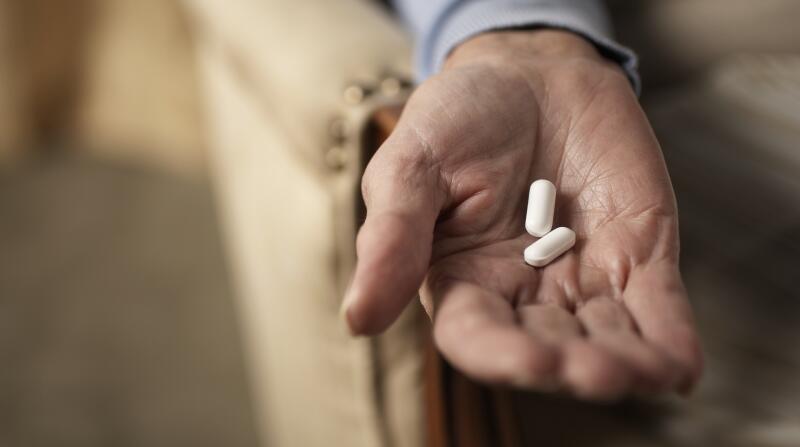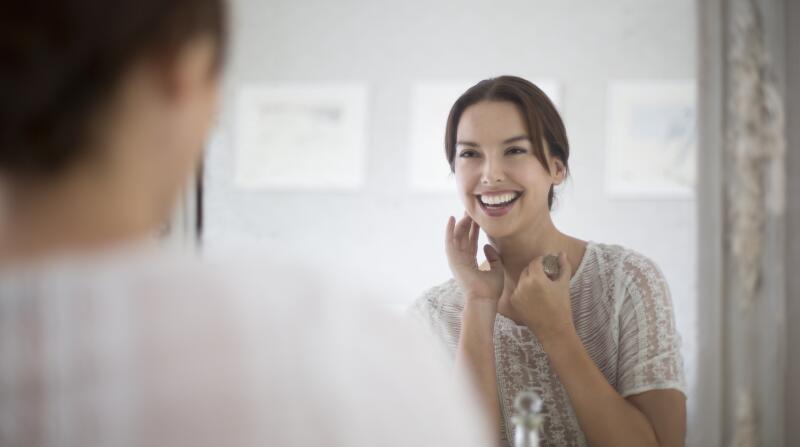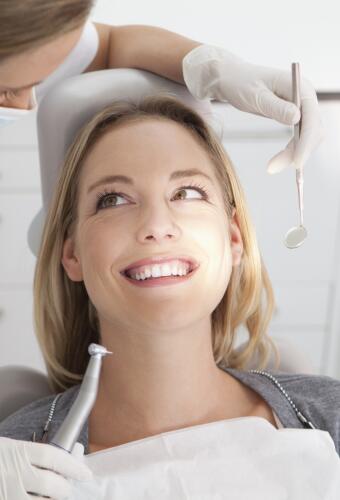12 Things Your Dentist Wants You to Know

Medically Reviewed By William C. Lloyd III, MD, FACS
-
 On your way to a bright and healthy smileEver wonder what your dentist is thinking as he or she peers into your mouth? Besides squeezing the tube from the bottom, are there other toothpaste tricks you should know? Read on to discover 12 tips from dental experts to help keep your smile healthy and bright.
On your way to a bright and healthy smileEver wonder what your dentist is thinking as he or she peers into your mouth? Besides squeezing the tube from the bottom, are there other toothpaste tricks you should know? Read on to discover 12 tips from dental experts to help keep your smile healthy and bright. -
 1. “Dentists are experts in far more than teeth.”Dentists help keep your smile looking great. But that’s just one benefit of climbing into the chair. These experts are focused on your entire oral health, including correcting jaw problems and detecting oral cancer. “Just as you see your primary doctor for checkups, regular dental visits help ensure your oral health is on track,” explains David J. Bennett, DDS.
1. “Dentists are experts in far more than teeth.”Dentists help keep your smile looking great. But that’s just one benefit of climbing into the chair. These experts are focused on your entire oral health, including correcting jaw problems and detecting oral cancer. “Just as you see your primary doctor for checkups, regular dental visits help ensure your oral health is on track,” explains David J. Bennett, DDS. -
-
 2. “There’s a right way to use your toothpaste.”Most people think of toothpaste as soap for your teeth. But it’s really a topical agent like lotion. The longer your toothpaste is in contact with your teeth, the more effective it is. “In addition to taking your time brushing, allow the toothpaste to sit on your teeth,” says Guy Acheson, DDS, MAGD. “Brush and spit out the foam, but then wait for a half-hour to rinse. This allows the toothpaste to have maximum effect.”
2. “There’s a right way to use your toothpaste.”Most people think of toothpaste as soap for your teeth. But it’s really a topical agent like lotion. The longer your toothpaste is in contact with your teeth, the more effective it is. “In addition to taking your time brushing, allow the toothpaste to sit on your teeth,” says Guy Acheson, DDS, MAGD. “Brush and spit out the foam, but then wait for a half-hour to rinse. This allows the toothpaste to have maximum effect.” -
 3. “Don’t floss out of guilt before your appointment.”Dentists can tell if you suddenly feel inspired to floss in the days right before your appointment. Don’t bother: Most of the time you’re hurting your gums more than helping them. “We can tell by your gums if you floss regularly or not. The health of your gum tissue depends on ongoing care,” says David L. Carlson, DDS. “Learn the right technique and then make a commitment to floss daily.”
3. “Don’t floss out of guilt before your appointment.”Dentists can tell if you suddenly feel inspired to floss in the days right before your appointment. Don’t bother: Most of the time you’re hurting your gums more than helping them. “We can tell by your gums if you floss regularly or not. The health of your gum tissue depends on ongoing care,” says David L. Carlson, DDS. “Learn the right technique and then make a commitment to floss daily.” -
 4. “Certain medications can increase the risk of tooth decay.”Some people think that once high school is behind them, cavities are as well. But adults can experience tooth decay. “We often see a spike in cavities in adults, even if they’ve had perfect oral health for years,” says David Carlson, DDS. “Many medications, like blood pressure or anti-anxiety medicine, can reduce salivary flow, which increases risk of decay. Always tell your dentist what medications you’re taking.”
4. “Certain medications can increase the risk of tooth decay.”Some people think that once high school is behind them, cavities are as well. But adults can experience tooth decay. “We often see a spike in cavities in adults, even if they’ve had perfect oral health for years,” says David Carlson, DDS. “Many medications, like blood pressure or anti-anxiety medicine, can reduce salivary flow, which increases risk of decay. Always tell your dentist what medications you’re taking.” -
 5. “Looks aren’t everything.”Even if your smile is beautiful, it’s important to see the dentist regularly. Gum disease can lurk where you don’t see it and cause your gums to recede. If that happens, your bones can also recede, causing a host of problems. “Think of your teeth as a house. No matter how beautiful it is, if it has a bad foundation, eventually everything will go,” Dr. Bennett explains. “Don’t use your looks as an indicator of oral health.”
5. “Looks aren’t everything.”Even if your smile is beautiful, it’s important to see the dentist regularly. Gum disease can lurk where you don’t see it and cause your gums to recede. If that happens, your bones can also recede, causing a host of problems. “Think of your teeth as a house. No matter how beautiful it is, if it has a bad foundation, eventually everything will go,” Dr. Bennett explains. “Don’t use your looks as an indicator of oral health.” -
-
 6. “Don’t let pain—or lack of it—be your guide.”In addition to how your teeth look, how your teeth feel can disguise dental problems. “Most oral problems don’t cause pain unless it’s serious,” explains Dr. Acheson. “If you go to the dentist regularly, we can pick up on problems early, allowing us to treat or even reverse them before they become painful.”
6. “Don’t let pain—or lack of it—be your guide.”In addition to how your teeth look, how your teeth feel can disguise dental problems. “Most oral problems don’t cause pain unless it’s serious,” explains Dr. Acheson. “If you go to the dentist regularly, we can pick up on problems early, allowing us to treat or even reverse them before they become painful.” -
 7. “Good dental habits can help your heart.”Studies show that the same bacteria that cause tooth decay are also linked to heart disease. That’s because infection in the gums can travel through the bloodstream to the rest of your body, raising dangerous inflammation levels. “Your mouth is not separate from the rest of your body,” says Dr. Bennett. “By preventing dental problems, you’re also caring for your overall health.”
7. “Good dental habits can help your heart.”Studies show that the same bacteria that cause tooth decay are also linked to heart disease. That’s because infection in the gums can travel through the bloodstream to the rest of your body, raising dangerous inflammation levels. “Your mouth is not separate from the rest of your body,” says Dr. Bennett. “By preventing dental problems, you’re also caring for your overall health.” -
 8. “You shouldn’t always brush right after a meal.”Feeling guilty about those potato chips? Hoping your glass of wine or cup of coffee won’t stain your teeth? Don’t rush for the toothbrush. “Brushing right after eating or drinking something acidic can actually soften the enamel of the teeth, which wears down the enamel,” explains Dr. Carlson. “To avoid doing more damage than good, wait an hour to brush, or rinse your mouth with water first.”
8. “You shouldn’t always brush right after a meal.”Feeling guilty about those potato chips? Hoping your glass of wine or cup of coffee won’t stain your teeth? Don’t rush for the toothbrush. “Brushing right after eating or drinking something acidic can actually soften the enamel of the teeth, which wears down the enamel,” explains Dr. Carlson. “To avoid doing more damage than good, wait an hour to brush, or rinse your mouth with water first.” -
 9. “You don’t need us to whiten your teeth.”Many dentists offer in-office whitening treatments, but that’s not the only way to give your pearly whites a boost. “Although office treatments are more concentrated and work faster, over-the-counter teeth whitening products like whitening strips use similar chemistry and are more cost effective,” says Dr. Carlson. “If you don’t have other dental problems, it’s fine to try these products first to see if you get the results you want.”
9. “You don’t need us to whiten your teeth.”Many dentists offer in-office whitening treatments, but that’s not the only way to give your pearly whites a boost. “Although office treatments are more concentrated and work faster, over-the-counter teeth whitening products like whitening strips use similar chemistry and are more cost effective,” says Dr. Carlson. “If you don’t have other dental problems, it’s fine to try these products first to see if you get the results you want.” -
 10. “Parents: your oral health can have a big impact on your baby.”Kissing, sharing spoons, and putting pacifiers in your mouth are all ways you and other caregivers transmit the harmful bacteria in your mouth to your little one. “The mix of bacteria introduced in a child’s first three years sets the stage for their oral health for life,” says Dr. Acheson. “Tooth decay is actually an infectious disease. Make sure you practice good dental hygiene and reduce the risk of spreading bacteria.”
10. “Parents: your oral health can have a big impact on your baby.”Kissing, sharing spoons, and putting pacifiers in your mouth are all ways you and other caregivers transmit the harmful bacteria in your mouth to your little one. “The mix of bacteria introduced in a child’s first three years sets the stage for their oral health for life,” says Dr. Acheson. “Tooth decay is actually an infectious disease. Make sure you practice good dental hygiene and reduce the risk of spreading bacteria.” -
 11. “Babies need to see the dentist, too.”Because bacteria can start to grow early, it’s important to bring your child to the dentist when the first tooth erupts or by his or her first birthday, whichever comes first. “There are many things dentists can do to get your baby’s oral health off to a good start,” says Acheson. “Don’t wait until your little one is a toddler for that first appointment. Tooth decay is 100% preventable.”
11. “Babies need to see the dentist, too.”Because bacteria can start to grow early, it’s important to bring your child to the dentist when the first tooth erupts or by his or her first birthday, whichever comes first. “There are many things dentists can do to get your baby’s oral health off to a good start,” says Acheson. “Don’t wait until your little one is a toddler for that first appointment. Tooth decay is 100% preventable.” -
 12. “Don’t let embarrassment keep you from calling us.”If you haven’t been to the dentist because you’re ashamed of your teeth, you’re not the only one. An estimated 40% of people don’t visit the dentist regularly. Many of them would rather keep their smile out of sight. “Don’t compare yourself to that veneered Hollywood smile. We don’t,” says Dr. Carlson. “Rest assured that dentists have seen it all, and we’re here to help, not judge.”
12. “Don’t let embarrassment keep you from calling us.”If you haven’t been to the dentist because you’re ashamed of your teeth, you’re not the only one. An estimated 40% of people don’t visit the dentist regularly. Many of them would rather keep their smile out of sight. “Don’t compare yourself to that veneered Hollywood smile. We don’t,” says Dr. Carlson. “Rest assured that dentists have seen it all, and we’re here to help, not judge.”
12 Things Your Dentist Wants You to Know


















